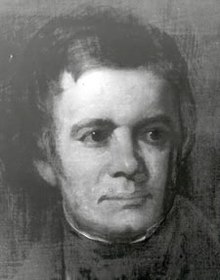David Rittenhouse Porter
David Rittenhouse Porter (born October 31, 1788 in Norristown , Pennsylvania , † August 6, 1867 in Harrisburg , Pennsylvania) was an American politician ( Democratic Party ) and from 1839 to 1845 the 9th governor of the state of Pennsylvania.
Early years
Porter attended Norristown Academy and then planned to study at Princeton University . But after it burned down in a fire in 1802, he had to change his plans. Instead, he worked for his father, who was the head of the Pennsylvania Land Survey. He then became manager of a hardware factory. In 1814 he became a partner in a factory called Sligo Iron Works, but five years later it went bankrupt during an economic crisis. At that time he was still studying law and began to be interested in cattle and horse breeding.
Political rise
After his company went bankrupt, Porter turned to politics. In 1820 he was elected to the Pennsylvania House of Representatives. He held this mandate for three legislative terms. He was then employed by the Huntingdon County District Court . He was then a clerk in the same county. From 1836 he was a member of the Pennsylvania Senate . In 1838 he was elected the new governor of his state. The election result against incumbent Joseph Ritner from the Anti-Masonic Party was very close and led to the election being challenged. There were sometimes bloody arguments between supporters on both sides before Porter was confirmed as governor.
Governor of Pennsylvania
David Porter took up his new office on January 15, 1839. He was the first Pennsylvania governor to serve under the terms of the new state constitution that came into effect in 1838. Among other things, this envisaged a limitation of the governors' term of office to two terms. Porter took full advantage of this opportunity. After re-election in 1842, he was able to serve until January 21, 1845. Almost his entire reign was overshadowed by the consequences of the economic crisis that broke out in 1837 . The governor responded with budget freezes and tax increases. On the other hand, he promoted the expansion of the infrastructure, especially the waterways and railways. Despite his austerity efforts, national debt rose 25% during Porter's tenure. But the state had enough reserves to pay the interest due.
In 1844, Porter was grappling with violent civil unrest in Philadelphia. He was an advocate of the separation of powers, and this led to a conflict with the legislature. The legislature interfered too much in the powers of the government and the courts, at least in Porter's view. This behavior earned him, albeit unsuccessful, impeachment proceedings on the part of the legislature.
Another résumé
After the end of his tenure, Porter largely withdrew from politics. In 1856 he supported James Buchanan's presidential campaign . Together with Sam Houston , the governor of Texas , he called for a transcontinental rail link across the United States. Both politicians voted for a southern route. In Harrisburg, Porter ran an iron smelting company. It was there that experiments were carried out for the first time with smelting furnaces that were fired with hard coal. David Porter lived through the Civil War and died in 1867. He was married to Josephine McDermott. The couple had a child. David Porter was a brother of George B. Porter , who was governor of the Michigan Territory between 1831 and 1834 .
The Porter Township in Clarion County was named after David Porter.
literature
- Robert Sobel and John Raimo (Eds.): Biographical Directory of the Governors of the United States, 1789–1978. Volume 4, Meckler Books, Westport, 1978. 4 volumes.
Web links
- David Rittenhouse Porter in the database of the National Governors Association (English)
- David Rittenhouse Porter ( April 17, 2008 memento in the Internet Archive ) in the Pennsylvania Historical and Museum Commission database
- David Rittenhouse Porter in the database of Find a Grave (English)
| personal data | |
|---|---|
| SURNAME | Porter, David Rittenhouse |
| BRIEF DESCRIPTION | American politician |
| DATE OF BIRTH | October 31, 1788 |
| PLACE OF BIRTH | Norristown , Pennsylvania |
| DATE OF DEATH | August 6, 1867 |
| Place of death | Harrisburg , Pennsylvania |

